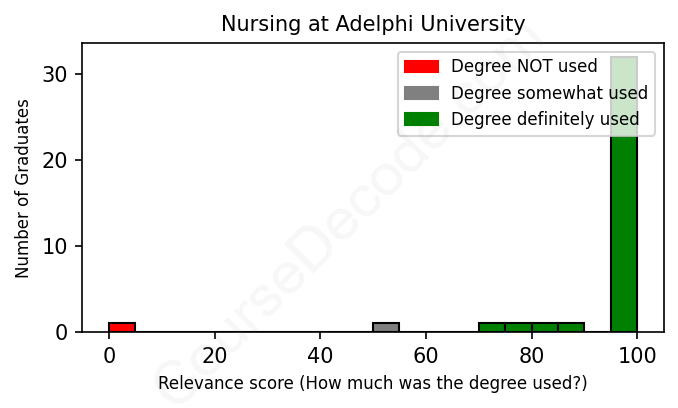
First, some facts. Of the Nursing graduates from Adelphi University we've analyzed , here's how many have used (or NOT used) their degree in their career:

These are estimates based on AI analysis of 38 LinkedIn profiles (see below).
The verdict? Great! Overall, with an average relevance score of 93%, Nursing graduates from Adelphi University have a substantially higher likelihood (+26%) of finding work in this field compared to the average graduate across all fields:
And for comparison, here's the chart for all profiles we've looked at across all degrees.
Also, after graduating, only 28% of these graduates have pursued further education other than another Bachelor's degree (such as a Masters degree or other), compared to the average across all profiles of 35%. This suggests a Bachelors degree is enough for most Nursing graduates, and it's normal to look for work straight after graduation.
See the details:
|
Relevance score: 100% We think this person has gone into a career highly relevant to their degree. We think this person has gone into a career highly relevant to their degree.
DEGREE INFOGraduated in 2015 from Adelphi University with a Bachelor of Science (B.S.) in Nursing. No other secondary education since. JOB HISTORY SINCE GRADUATIONRegistered Nurse Northwell Health Jan 2016 - Present ABOUTNo information provided. |
The top 10 most common jobs done by the graduates we've analyzed (ranked most common to least) are:
Most of the jobs taken by graduates from Adelphi University with a degree in Nursing are closely related to nursing, showcasing a strong link between the education received and their career paths. Many graduates have taken on roles as Registered Nurses (RNs) in a variety of settings, including hospitals, clinics, and specialized care units. These positions, such as Cardio-thoracic ICU Nurse, Emergency Room Nurse, and Women's Health Nurse Practitioner, are direct applications of the nursing skills they gained during their studies, demonstrating high relevance. Traveling nursing positions also appear frequently, which similarly require the same competencies and knowledge base.
However, there are also some graduates who have pursued roles that diverge from traditional nursing paths. For instance, positions like Co-Founder of wellness organizations, Event Coordinator, or even roles in retail and food service do not utilize nursing skills directly. While these roles may have some overlapping health-related or management aspects, they generally lack the focused application of nursing knowledge. Overall, it’s clear that a significant majority of the graduates have chosen jobs that strongly align with their nursing education, making them well-prepared for their careers in healthcare.
Here is a visual representation of the most common words in job titles for Nursing graduates (this is across all Nursing graduates we've analyzed, not just those who went to Adelphi University):

Graduates from Adelphi University's Nursing program generally have a solid track record of building successful careers in various nursing roles shortly after graduation and continuing to advance in the field over the years. Most of these alumni land their first job as Registered Nurses in hospitals or healthcare facilities, often starting in areas like emergency rooms, critical care, or pediatrics. It seems like a typical path involves gaining experience as a staff nurse or doing travel nursing assignments right after school, which not only helps them secure their footing in the healthcare industry but also provides exposure to diverse medical situations and environments.
Looking further down the line, about five to ten years post-graduation, many alumni progress into more specialized roles or take on leadership positions, such as Nurse Practitioners, Clinical Supervisors, or Nurse Managers. Some even venture into entrepreneurial endeavors or educational roles, like adjunct professors. This reflects a healthy trajectory of career advancement in nursing, where graduates remain committed to the healthcare field, contributing their expertise and improving patient care in various capacities. Overall, it looks like an impressive trend, with most graduates staying relevant in nursing or closely related professions, rather than straying into unrelated occupations.
Getting a Bachelor’s degree in Nursing can be pretty challenging, and that’s true at Adelphi University as well as many other schools. It involves a mix of science courses like biology and chemistry, along with clinical practice and nursing theory, so you’re dealing with a pretty hefty workload. You’ll find that classes can be intense, with hands-on learning in labs and real-life scenarios in hospitals, which can be a lot to juggle. It’s definitely not a walk in the park, but if you’re passionate about helping others and are ready to study hard, it’s totally doable! Just be prepared to put in some serious effort and time.
Most commonly, in the LinkedIn profiles we've looked at, it takes people 4 years to finish a Bachelor degree in Nursing.
So, looking at this group of nursing grads from Adelphi University, it seems like most of them have generally been able to secure solid nursing positions that likely pay decently well, especially considering the experience and specialty roles they've taken on over the years. Many of them have held positions in reputable hospitals and institutions, and some have even moved into roles like Nurse Practitioners and Clinical Supervisors, which usually come with better pay. However, there are a few grads who have had job changes or have done other types of work that might not be as financially rewarding, like part-time server jobs. Overall, though, I'd say it looks like most of them are on a pretty good financial track given the stable nature of nursing jobs and the continued demand for healthcare professionals!
Here is a visual representation of the most common words seen in the "about" section of LinkedIn profiles who have a Bachelor degree in Nursing (this is across all Nursing graduates we've analyzed, not just those who went to Adelphi University). This may or may not be useful:

Here are all colleges offering a Bachelor degree in Nursing (ordered by the average relevance score of their Nursing graduates, best to worst) where we have analyzed at least 10 of their graduates: